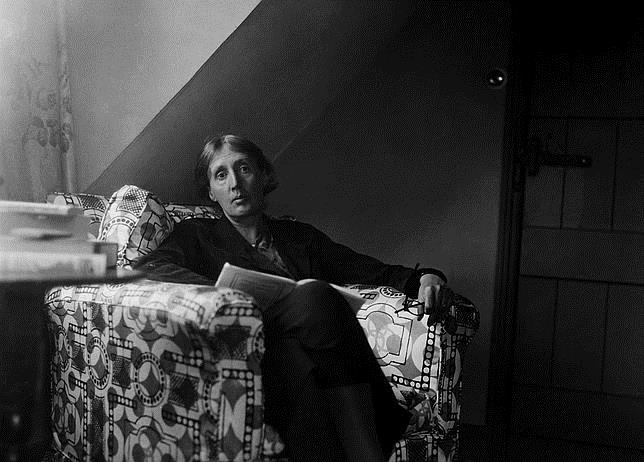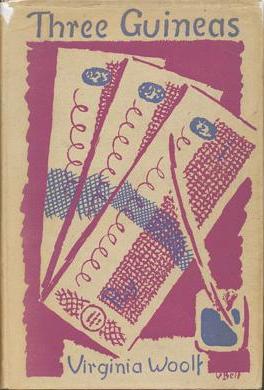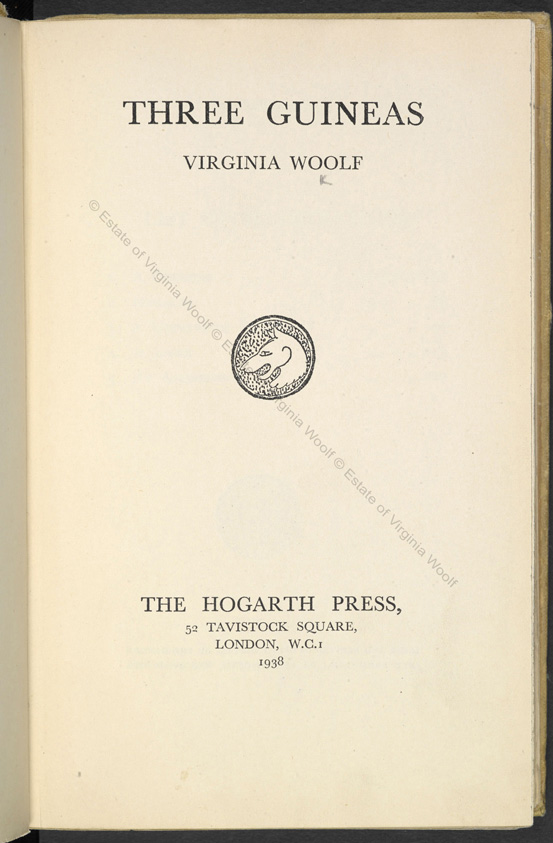
Unanswered, Thoughts on Virginia Woolf’s “Three Guineas”

Virginia Woolf published the book-length essay Three Guineas in June 1938. The essay responds to an imaginary letter sent from an “educated gentleman” asking Woolf to join his efforts to prevent war. Woolf, a committed pacifist, is more than aware that war is looming. And yet she lays out a lengthy, multi-pronged argument backed by historical and sociological research (which she conducted in order to write Three Guineas) for why it is, as a woman, she cannot answer his request.
The unnamed gentleman asks for something more than just monetary support; he asks her specifically for her opinion on how best to prevent war. Woolf begins her response by first stating that the man’s letter is “remarkable…a letter perhaps unique in the history of human correspondence, since when before has an educated man asked a woman how in her opinion war can be prevented?” Woolf proceeds to illustrate just how she—the daughter of an educated man—cannot answer him, since she is without access or place in the public world of professions, universities, societies, and government. In short, there are fundamental differences that will make her “impossible for [educated men] to understand.”
The central conflict of Three Guineas is put into place, between the desire to leave behind the stifling private home so as to help prevent war (an aim that Woolf certainly shares with the man who wrote to her) and an unwillingness to simply ally with the public world of men. “Behind us lies the patriarchal system; the private house, with its nullity, its immorality, its hypocrisy, its servility. Before us lies the public world, the professional system, with its possessiveness, its jealousy, its pugnacity, its greed.”
Leah Falk, on the website VIDA, Women in the Literary Arts, writes, “In 1938, writing Three Guineas, Virginia Woolf bemoaned to her imaginary correspondent the fact that in order for women to receive an education that would allow them to earn a living, already a struggle, they had to subject themselves to the very values of competition and domination they hoped to escape by wriggling out from the financial grips of men.” In other words, those very values that incite war in the first place.
As the title Three Guineas suggests, Woolf not only responds to this one letter but she also brings into the argument two other requests she has received: one for funds to help rebuild a woman’s college, and another to support an organization that helps women enter professional life. In responding to all three letters, Woolf articulates her criticisms of the educational and professional structures in her country (showing how they, in fact, encourage the mindsets that lead to Fascism), and that while she understands the values of education and public service, she cannot support the present-day conditions of these areas of life for her sex (and to be clear Woolf was speaking almost exclusively about “daughters of educated men”). Something fundamental would have to shift for war to be prevented. The same old teachings and public order would only produce the same results. She imagines, as an example, a new kind of college that avoids teaching the tools of domination and pugnacity, “an experimental college, an adventurous college…. It should teach… the art of understanding other people’s lives and minds….”
It is more than likely that this is not the response the educated gentleman expected to receive. In fact, it is a response that has not yet been fully acted upon even today, in 2022. Woolf was speaking about Britain, but the same is true for the conditions in which woman live day to day in the United States. What access or place do women have now in the public world of professions, universities, societies, and government? Maybe this has something to do with the other fact—that war, still, has not been prevented.


Image: The British Library
From Three Guineas, by Virginia Woolf
“Three years is a long time to leave a letter unanswered, and your letter has been lying without an answer even longer than that. I had hoped that it would answer itself, or that other people would answer it for me. But there it is with its question—How in your opinion are we to prevent war?—still unanswered.
It is true that many answers have suggested themselves, but none that would not need explanation, and explanations take time. In this case, too, there are reasons why it is particularly difficult to avoid misunderstanding. A whole page could be filled with excuses and apologies; declarations of unfitness, incompetence, lack of knowledge, and experience: and they would be true. But even when they were said there would still remain some difficulties so fundamental that it may well prove impossible for you to understand or for us to explain. But one does not like to leave so remarkable a letter as yours—a letter perhaps unique in the history of human correspondence, since when before has an educated man asked a woman how in her opinion war can be prevented?—unanswered. Therefore let us make the attempt; even if it is doomed to failure. …
Let us concentrate upon the practical suggestions which you bring forward for our consideration. There are three of them. The first is to sign a letter to the newspapers; the second is to join a certain society; the third is to subscribe to its funds. Nothing on the face of it could sound simpler. To scribble a name on a sheet of paper is easy; to attend a meeting where pacific opinions are more or less rhetorically reiterated to people who already believe in them is also easy; and to write a cheque in support of those vaguely acceptable opinions, though not so easy, is a cheap way of quieting what may conveniently be called one’s conscience. Yet there are reasons which make us hesitate; reasons into which we must enter, less superficially, later on. Here it is enough to say that though the three measures you suggest seem plausible, yet it also seems that, if we did what you ask, the emotion caused by the photographs would still remain unappeased. That emotion, that very positive emotion, demands something more positive than a name written on a sheet of paper; an hour spent listening to speeches; a cheque written for whatever sum we can afford—say one guinea. Some more energetic, some more active method of expressing our belief that war is barbarous, that war is inhuman, that war, as Wilfred Owen put it, is insupportable, horrible and beastly seems to be required. But, rhetoric apart, what active method is open to us? Let us consider and compare. You, of course, could once more take up arms—in Spain, as before in France—in defence of peace. But that presumably is a method that having tried you have rejected. At any rate that method is not open to us; both the Army and the Navy are closed to our sex. We are not allowed to fight. Nor again are we allowed to be members of the Stock Exchange. Thus we can use neither the pressure of force nor the pressure of money. The less direct but still effective weapons which our brothers, as educated men, possess in the diplomatic service, in the Church, are also denied to us. We cannot preach sermons or negotiate treaties. Then again although it is true that we can write articles or send letters to the Press, the control of the Press—the decision what to print, what not to print—is entirely in the hands of your sex. It is true that for the past twenty years we have been admitted to the Civil Service and to the Bar; but our position there is still very precarious and our authority of the slightest. Thus all the weapons with which an educated man can enforce his opinion are either beyond our grasp or so nearly beyond it that even if we used them we could scarcely inflict one scratch. If the men in your profession were to unite in any demand and were to say: “If it is not granted we will stop work,” the laws of England would cease to be administered. If the women in your profession said the same thing it would make no difference to the laws of England whatever. Not only are we incomparably weaker than the men of our own class; we are weaker than the women of the working class. If the working women of the country were to say: “If you go to war, we will refuse to make munitions or to help in the production of goods,” the difficulty of war-making would be seriously increased. But if all the daughters of educated men were to put down tools tomorrow, nothing essential either to the life or to the war-making of the community would be embarrassed. Our class is the weakest of all the classes in the state. We have no weapon with which to enforce our will. ...”
Excerpted with the permission of The Society of Authors as the Literary Representative of the Estate of Virginia Woolf.
Resources: Three Guineas by Virginia Woolf, 1938; Wikipedia; VIDA, Women in the Literary Arts
Virginia Woolf (25 January 1882 – 28 March 1941) was an English writer, considered one of the most important modernist twentieth-century authors and a pioneer in the use of stream of consciousness as a narrative device.

